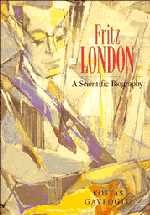Book contents
- Frontmatter
- Contents
- Preface
- Acknowledgements
- 1 From philosophy to physics
- 2 The years in Berlin and the beginnings of quantum chemistry
- 3 Oxford and superconductivity
- 4 Paris and superfluidity
- 5 Tying up loose ends: London in the USA
- Afterword: background leading to the microscopic theory of superconductivity by John Bardeen
- Publications by Fritz London
- Bibliography
- Index
5 - Tying up loose ends: London in the USA
Published online by Cambridge University Press: 12 January 2010
- Frontmatter
- Contents
- Preface
- Acknowledgements
- 1 From philosophy to physics
- 2 The years in Berlin and the beginnings of quantum chemistry
- 3 Oxford and superconductivity
- 4 Paris and superfluidity
- 5 Tying up loose ends: London in the USA
- Afterword: background leading to the microscopic theory of superconductivity by John Bardeen
- Publications by Fritz London
- Bibliography
- Index
Summary
After the unhappy years in Oxford and the hopeful years in Paris, North Carolina, USA, was a melancholy place. At Duke University, the very private London was lonely and scientifically isolated. He was not associated, even peripherally, with the atom bomb project, and he was far away from where the action took place after the end of the war.
He made several trips to Europe and he was the main speaker at the first International Conference in Low Temperature Physics in Cambridge in 1946. He enjoyed it immensely, even though he felt that ‘the level of physics was that of 1939’. At the time, London was not sympathetic to Tisza's two-fluid model. Experimental results sent by the Soviet physicists who could not attend the conference, appeared to give credence to Tisza's model, and London changed his mind and adopted it, hoping to show that his proposed mechanism of Bose–Einstein condensation could be the theoretical rationale for the two-fluid model. But there was an additional reason for adopting the model. Lev Landau, the enfant terrible of the Soviet Union, had proceeded along a different path, trying to explain superfluidity by quantum hydrodynamics. This particularly ambitious scheme had its weaknesses, but had to be reckoned with, especially since this author, highly regarded in the West, was ostentatiously ignoring London's work on superconductivity and superfluidity.
In March 1953, London was informed that the Royal Netherlands Academy of Sciences had awarded him the prestigious Lorentz Medal, which was presented every five years.
- Type
- Chapter
- Information
- Fritz LondonA Scientific Biography, pp. 180 - 266Publisher: Cambridge University PressPrint publication year: 1995



